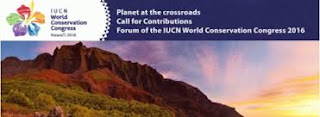Honolulu, Hawaiʻi, 6 September (IUCN) – Limiting illegal trade in
threatened species, promoting nature-based solutions to climate change and
accounting for biodiversity conservation in the development of renewables are
among the first global conservation priorities set today at the IUCN World
Conservation Congress taking place in Hawaiʻi.
The 85
motions adopted by IUCN’s 1,300 government and civil society Members –
following the first-ever electronic vote cast in August 2016 – include a ban on
gillnet fishing threatening the vaquita porpoise and restrictions on trade of
pangolins.
Another 14
global conservation issues will be debated and voted on over the next few days
at the IUCN Congress, including advancing the conservation of the high seas,
mitigating the impacts of oil palm expansion on biodiversity, protecting
primary forests and closure of domestic markets to all ivory sales.
“The new
electronic voting system has made the already democratic institution even more
democratic,” says Enrique Lahmann, IUCN
Congress Director. “By giving IUCN’s government and NGO Members time to
reflect and arrive at convergence on critical issues such as illegal wildlife
trade, we have used technology to boost the governance of nature.”
Members
have urged for restrictions on trade in threatened pangolin species to
exceptional cases only, as defined by the Convention on International Trade in
Endangered Species (CITES). Despite current protection measures at the global
and local levels, the species’ survival is at risk due to overexploitation,
illegal trade and degradation of its habitat.
Unsustainable
fisheries were the focus of another decision drawing attention to the imminent
extinction threat facing the Critically Endangered vaquita in Mexico. IUCN’s
government and NGO Members have urged for a permanent ban to gillnet fishing
throughout the entire vaquita range in the Pacific Ocean. The vaquita is the
bycatch of fishing of totoaba.
Members of
IUCN have also defined nature-based solutions as actions that protect and
manage ecosystems, while effectively addressing societal challenges, such as
food and water security, climate change, disaster risk reduction, human health
and economic well-being. The concept of nature-based solutions is particularly
relevant to the achievement of Sustainable Development Goals.
Renewable
energy has been the focus of two decisions adopted by IUCN Members, who have
encouraged governments to implement energy efficiency and renewable energy
plans, taking into account biodiversity conservation. IUCN Members also called
for enhanced efforts to minimise the impacts of offshore renewable energy
technologies on marine life.
IUCN
Members have also called for attention to the increasing use of ‘synthetic
biology’, whose implications on biodiversity and human well-being remain
unclear. According to the decision, the international conservation community
needs to assess this emerging field and its impacts.
Motions
are proposed by IUCN Members every four years to set priorities for the work of
IUCN - a unique membership union gathering 217 state and government agencies,
1, 066 NGOs, and networks of over 16,000 experts worldwide.


No comments:
Post a Comment